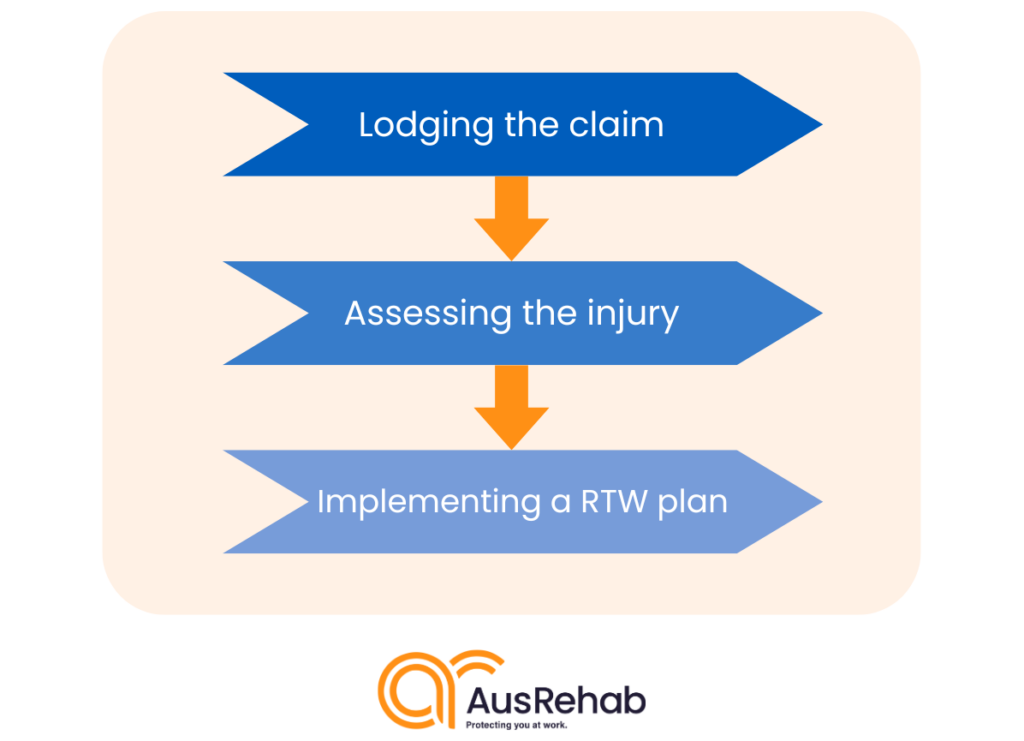Dec 18, 2024 • 7 min read
Debunking Common Workers Comp Myths

Written by: Devanshi Sarda
Across Australia, approximately 139,000 workers compensation claims are lodged annually. Even then, many employers continue to have significant misconceptions about workers compensation. Some of these beliefs can lead to non-compliance, increased liability, financial losses and employee dissatisfaction.
Below, we debunk the most common workers comp myths that many employers have. Getting to the bottom of these is key to building a stronger workplace environment that benefits both your business and your workers.
Myth 1: Workers comp claims lead to skyrocketing insurance premiums for our business.
Employers often worry that every additional workers compensation claim lodged against them increases their insurance premiums, and that over time, the profitability of their business is threatened.
While it’s true that claims influence premiums, the impact is typically manageable and can be mitigated with proactive injury management strategies, such as:
- Return to work (RTW) programs
- Hiring a RTW Coordinator to manage injury-related issues
- Investing in workplace ergonomics through ergonomic assessments and ergonomic equipment
- Conducting work health and safety training for all employees
- Fostering a safety-first workplace culture
- Engaging a qualified workplace rehabilitation provider to streamline injury management and support effective return to work (RTW) plans
Employers often worry that every additional workers compensation claim lodged against them only increases their insurance premiums, and that over time this would threaten the profitability of their business. While it’s true that claims can influence premiums, the impact is typically manageable and can be mitigated with several strategies.
These proactive strategies not only facilitate cost efficiency in the short term, they also reduce long-term risks such as:
- Legal and compliance issues
- Higher insurance premiums
- Chronic injuries and recurring claims
Myth 2: Workers comp claims are a hassle to the business.
Employers often believe that workers comp claims create unnecessary disruptions, consume valuable time, and complicate management processes. In reality, this is far from the case when workers comp is approached with the right strategies.
Workers comp claims are not proven to be a hassle when employers recognise how straightforward the process can be with the right structure in place. Most workers comp claims follow a clear and standardised procedure that looks like this:

Working with the right stakeholders can prove crucial in helping employers feel less helpless in navigating this process. Collaborating with the right insurers and workplace rehab providers can make all the difference between a vexing claim and a satisfactory return to work outcome.
Myth 3: I don’t need to renew my workers compensation policy.
Some employers find workers compensation policies to be an unnecessary business expense, especially when they haven’t had any claims.
However, not maintaining a valid workers comp policy can expose your business to significant legal and financial risks, with consequences that far outweigh any perceived short-term savings.
In most jurisdictions including NSW, maintaining a valid workers compensation policy is a legal requirement. Failing to renew the policy makes the business vulnerable to legal risks, and places the full financial burden of workplace injuries on the employer. This includes covering:
- Medical expenses
- Lost wages
- Potential legal liabilities
By ensuring your company’s workers compensation policy is up-to-date, employers are complying with the law and also able to safeguard their business from unforeseen financial challenges.
Myth 4: I need to provide workers comp for my full-time employees only.
It’s often believed that workers compensation coverage applies only to full-time employees. However, in NSW, workers compensation laws extend to all types of employees including:
Businesses face significant risks particularly when they overlook part-time, casual or contractor employees, as these groups are often mistakenly excluded from workers comp coverage. If an injury occurs and they’re not covered, the employer may face unexpected out of pocket costs, including:
- Medical expenses
- Lost wages
- Legal disputes
- Hefty fines
- Legal disputes
- Unprotected liability for workplace injuries
Additionally, businesses that fail to include all eligible workers not only risk audits, penalties, and legal consequences but also fall short of their moral and ethical obligation to treat all employees equally. By neglecting to support part-time, casual, or contractor employees who sustain injuries, employers risk eroding trust, damaging workplace morale, and undermining a culture of fairness and inclusivity.
For more details on workers compensation requirements for different types of employees, visit the AusRehab knowledge base.
Myth 5: Workers comp only applies to high-risk jobs, so it’s not a concern for my business.
Some employers incorrectly assume that workers compensation is only necessary for high-risk industries involving construction or manual labour. However, the truth is that workplace injuries can occur in any setting – including office-based or low-risk work environments.
In office environments, common claims include repetitive strain injuries (RSIs) that result from prolonged computer use and poor ergonomics, as well as mental health conditions due to rising workplace pressures. According to Safe Work Australia, 32.6% of serious workers compensation claims were for RSIs and 10.5% for mental health conditions.
Ensuring compliance with workers comp laws – which cover all eligible injuries regardless of cause or severity – both protects employees as well as highlights the employer’s foresight in addressing less visible workplace risks.
Myth 6: Accommodating an injured worker will disrupt team morale.
Providing modified duties for injured workers could potentially lead to an unfair redistribution of workload and resources, thereby negatively impacting team morale.
Developing inclusive return to work (RTW) programs can turn this challenge into an opportunity to foster teamwork and collaboration. By clearly communicating the temporary nature of adjustments and involving the team in supporting their injured colleague, businesses can create an environment where employees feel valued and supported.
To ensure that the RTW programs are implemented effectively, businesses should consider hiring a qualified and experienced RTW coordinator. A skilled coordinator would be responsible for:
- Manage the process
- Address concerns around workload redistribution
- Provide tailored solutions to minimise disruption
Myth 7: Rehabilitation programs are an unnecessary expense with little returns.
The apprehension some employers may feel towards rehabilitation programs is understandable. Rehabilitation is expensive after all, and has no guaranteed end date. This makes it sound like a business expense that can be avoided simply by persuading their injured employee to opt for a cheaper recovery option.
However, employers need not worry as the injured worker’s rehab program is typically funded by the insurer. Moreover, rehabilitation programs, when implemented effectively, can produce:
- Shortened recovery times for injured workers
- Reduced claim costs
- Increased likelihood of employees resuming their roles
- Higher work productivity levels
- Long-term cost savings
Let AusRehab Put Those Myths to Rest
Understanding the workers compensation system well is crucial to fostering a safe, compliant, and supportive workplace. By partnering with AusRehab, our expert team can guide you in navigating the system with ease, helping your business reduce claim costs and gain a more resilient workforce.
Speak to us today to find out how we can help you achieve your business goals while safeguarding the welfare of your employees.
Want to Make a Change? Share with Anyone, Anywhere.
Don’t forget to share!

Devanshi creates insightful content that highlights best practices in injury management, ergonomic solutions, and strategies to foster safer work environments. Devanshi’s writing aims to inform and support businesses and workers in implementing effective workplace safety measures and rehabilitation practices.
Subscribe to stay updated on the latest workplace news.

Resolve your work
place injury today
